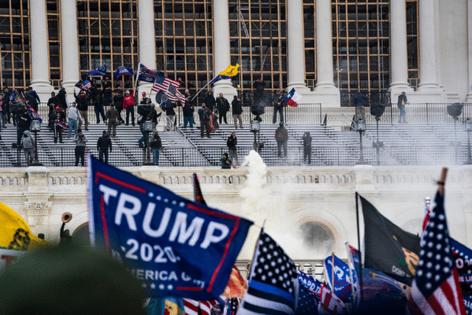Seattle cops who went to Jan. 6 rally ask US Supreme Court for anonymity
Published in News & Features
SEATTLE — Four current and former Seattle police officers who attended the Jan. 6, 2021, insurrection at the U.S. Capitol have asked the U.S. Supreme Court to protect their identities as they fight a Washington court decision ordering the release of their names.
Their attorney is asking the justices to stay the execution of a unanimous decision by the Washington Supreme Court issued Feb. 13 finding the officers should be identified by name in court proceedings. The officers had filed a lawsuit, identifying themselves as "John Does 1-4," challenging the release of their names and details of an investigation into their attendance at the violent "Stop the Steal" political protest rally in Washington, D.C.
The investigation, conducted by the civilian-run office of police accountability, concluded the officers did not violate any laws or Seattle Police Department. Two other officers who attended the protest were fired.
A King County Superior Court judge had ordered the names of the four released, however the Court of Appeals issued an injunction stopping the release. The petitioner, Seattle lawyer Sam Sueoka, appealed to the state Supreme Court, which overturned the Court of Appeals.
The officers' attorney, Joel Ard, asked for reconsideration from the state Supreme Court's decision, which was denied April 9, resulting in his petition to the U.S. Supreme Court, according to court records.
In his petition to the U.S. Supreme Court, filed Tuesday, Ard argues that releasing the officers' identities would cause irreparable harm and violate their First Amendment rights — a claim rejected by the state justices.
"These records include, among other records, transcripts of interviews in which the applicants were compelled to participate, under threat of termination, and were required to disclose their political beliefs, affiliations, reasons for attending the rally, and their mental impressions as to the contents of the rally," Ard wrote.
"At its core, this appeal involves whether a government agency can ignore the chilling effect resulting from an employer requiring an employee to disclose their off-duty political activities ... followed by widespread dissemination to those who deliberately seek this information to subject those public servants to vilification without the commission of any misconduct whatsoever," the appeal states.
Sueoka's lawyer, Neil Fox, said Justice Elena Kagan has asked that he file a response to the officers' motion for a stay by next Friday. Should the justices issue a stay, the next move would be for the officers to file a petition asking the high court to certify the issue for consideration.
The Washington Supreme Court's justices found the officers failed to cite an applicable exemption to the state's Public Records Act and had not shown how their right to privacy in this instance would overcome the public's right to know.
"We conclude they have not met that burden because they have not shown they have a privacy right in public records about their attendance at a highly public event," wrote Washington Supreme Court Justice Raquel Montoya-Lewis in the majority opinion. The right to privacy is reserved for "personal information" of a sort that its release would be considered "highly offensive" — not the fact that someone attended a public event along with tens of thousands of others, she wrote.
"Further," she continued, "off-duty acts of a police officer can be disclosable if their actions 'bear upon (their) fitness to perform public duty' because 'privacy considerations are overwhelmed by public accountability.'"
A key argument made by the officers is that the statements they made during the office of police accountability investigation were compelled through the use of a statute called Garrity v. New Jersey that allows public employers to order employees to answer questions that might violate their Fifth Amendment protection against self-incrimination. If they refuse to answer, they can be terminated.
To protect the employee, Garrity states those compelled statements cannot be used against the employee in a criminal case.
The four officers argue that those compelled statements include information that is personal and protected.
"Respectfully, the Washington State Supreme Court ignored the long line of cases finding time and time again that the First Amendment affords those who participate in protected political activity to be free from compelled disclosure of their identities," Ard wrote. "This appeal involves important federal constitutional questions which intersect state freedom of information laws."
© 2025 The Seattle Times. Visit www.seattletimes.com. Distributed by Tribune Content Agency, LLC.







Comments